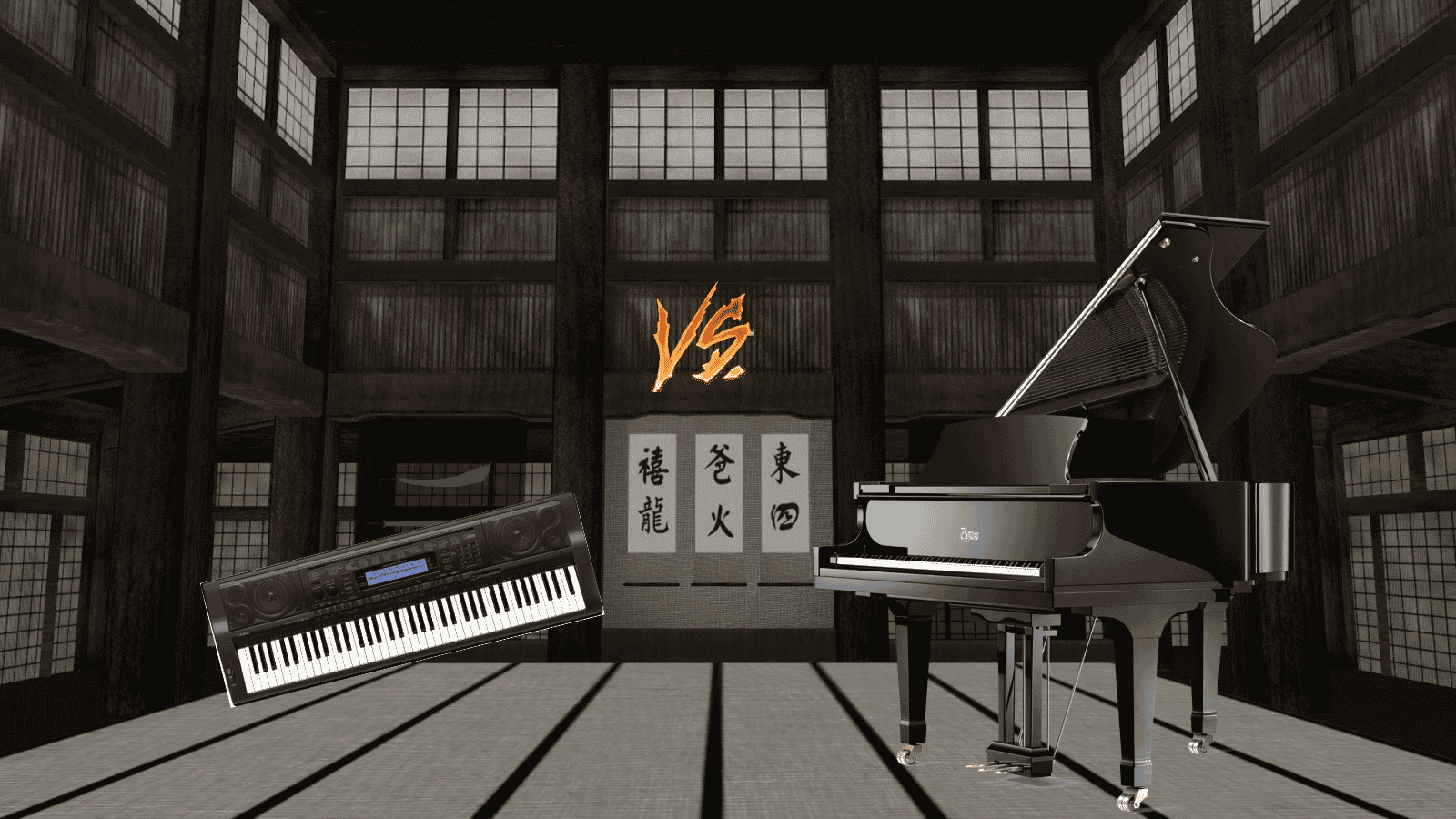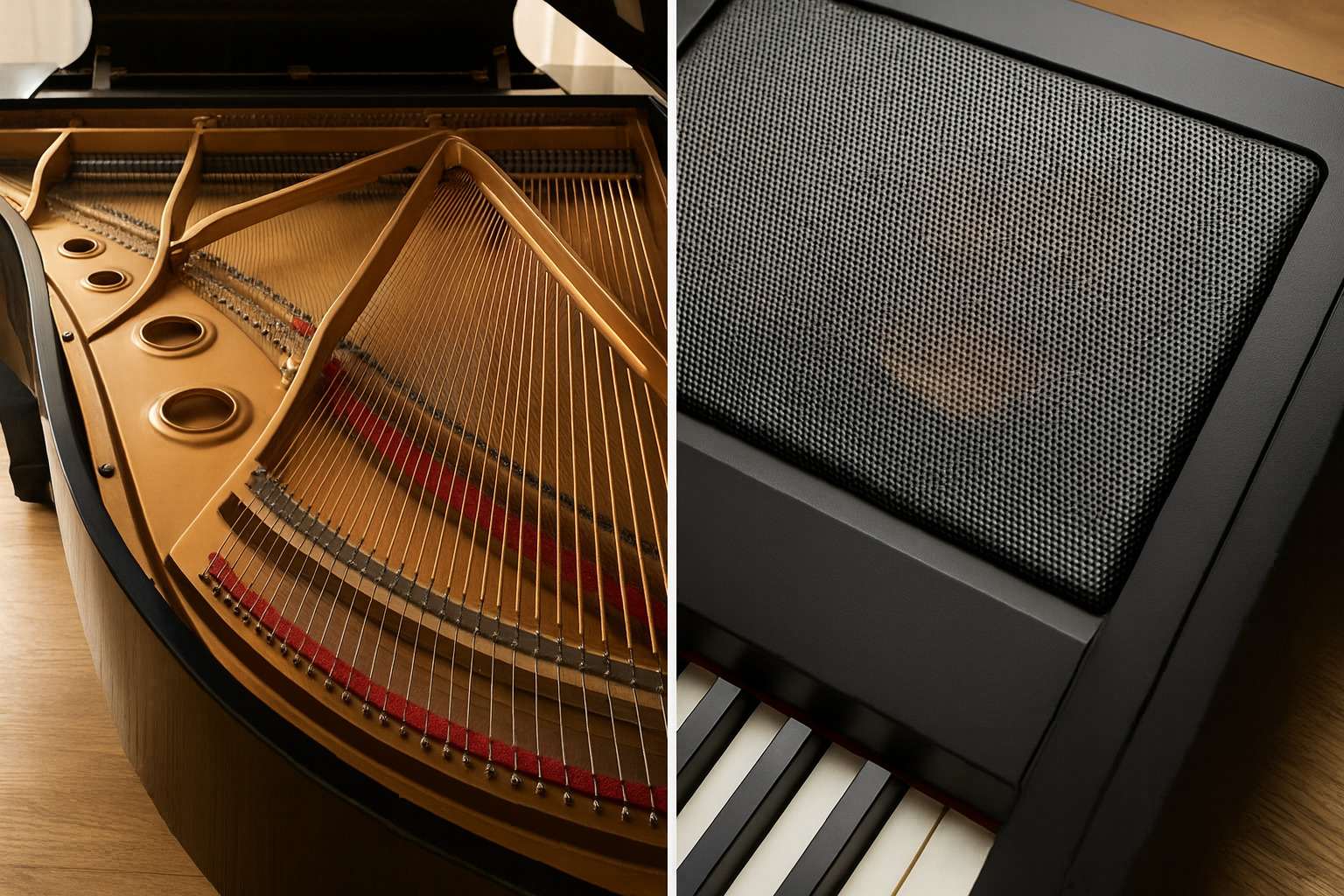Acoustic vs Digital Piano: Which Is Actually Better for Beginners?

I’ve taught hundreds of students on everything from 100-year-old uprights to the newest Yamaha and Roland digitals. I’ve paid tuning bills that made me cry. I’ve also practiced at 2 a.m. with headphones and zero neighbor complaints.
If you’re stuck deciding between acoustic vs digital piano, upright vs digital piano, or simply asking “is a digital piano as good as a real piano?” – this is the page that finally ends the debate.
Acoustic vs Digital Piano: Quick Cheat Sheet for Beginners
| Question | Winner for Most Beginners | Why |
|---|---|---|
| Sound | Acoustic | Real strings win on depth |
| Feel & technique | Tie (high-end digital = good upright) | Top digitals now feel 95% real |
| Silent practice & headphones | Digital | Game over |
| Never tuning again | Digital | $0 vs $150–$250 every 6 months |
| Space & weight | Digital | 25 lbs vs 400–1,200 lbs |
| Total cost first 5 years | Digital | Usually half the price |
| Best for serious classical long-term | Acoustic | If budget/space allow |
Digital or Acoustic Piano for Beginners: My Real Answer

95% of beginners (kids and adults) should start on a good digital.
Here’s why I say that every single week:
- You’ll actually practice (headphones = no guilt at night)
- You won’t quit because tuning bills killed the vibe
- Modern actions are so good that your technique transfers perfectly to a real acoustic later
- You can try piano for $500 instead of $5,000 and see if you love it
The only beginners who should go acoustic first are the ones who already know they’re in love with the instrument and have a dedicated, climate-controlled room.
Digital Piano vs Upright Piano: The Comparison Everyone Actually Searches For
Most people picturing “real piano” think of the big wooden upright against the wall. So let’s settle this head-to-head.
| Feature | Typical Upright (Acoustic) | Typical Good Digital | Winner |
|---|---|---|---|
| Weight | 400–600 lbs | 25–80 lbs | Digital |
| Depth (space needed) | 2 feet+ | 11–15 inches | Digital |
| Tuning cost per year | $300–$600 | $0 | Digital |
| Key action feel | Excellent (if regulated) | Excellent on Roland/Yamaha/Kawai | Tie |
| Volume control | None | Full + headphones | Digital |
| Moving cost | $300–$800 | Free or $50 | Digital |
| Resale value after 10 years | Usually holds | Drops fast | Acoustic |
Real talk: I love uprights. I learned on one. But unless you have space, money, and patience, a digital will make you play more and progress faster.
Is a Digital Piano as Good as a Real (Acoustic) Piano?
Short answer: For 99% of learning and playing, yes.
Long answer:
- Sound: 90–95% there on flagship models (Clavinova CVP, Roland LX, Kawai CA).
- Feel: Top actions (Roland PHA-50, Yamaha NWX, Kawai GFIII) are indistinguishable from most uprights in blind tests.
- Inspiration: Real strings still win for emotional depth, but headphones + good samples can move you just as much day-to-day.
Acoustic vs Electric Piano vs Digital Piano: Clearing the Confusion
Quick clarification because Google is full of this mess:
- Acoustic piano = real strings and hammers (upright or grand)
- Electric piano = vintage Rhodes or Wurlitzer (tines or reeds, totally different warm funky sound)
- Digital piano = modern weighted 88-key instrument that samples acoustic pianos
So when someone searches “acoustic vs electric piano,” they usually mean acoustic vs digital. Now you know.
Acoustic Piano vs Keyboard: Don’t Make This Beginner Mistake
Keyboard = 61 semi-weighted keys, springy action, built-in speakers, 600 sounds.
Digital piano = 88 fully weighted hammer-action keys made to feel and sound like a real piano.
Never learn proper technique on a keyboard. Your hands will hate you later.
Final Verdict: Which Should You Buy Right Now?
Buy acoustic if:
- You have the space and budget
- You’re already committed for life
- You want that living, breathing instrument every day
Buy digital if:
- You’re a beginner or returning adult
- You live in an apartment/condo
- You practice odd hours
- You want to test the waters without spending $5k+
Still not sure? Tell me your exact situation in the comments (budget, living space, goals, kids or adult) and I’ll tell you exactly what to buy in one sentence.
Now stop overthinking and start playing. The piano you actually touch every day beats the “perfect” one gathering dust.

Comments ()